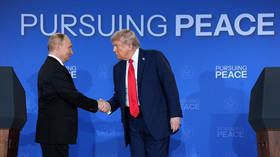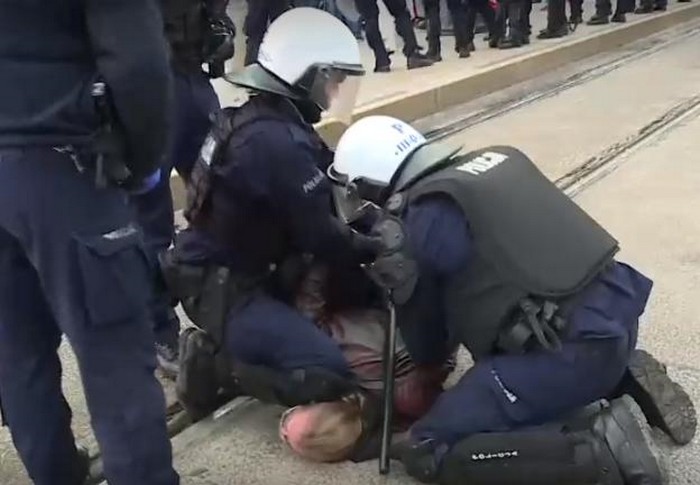Another book by prof. Stanisław Bielen entitled “Time of hazard in global Relations” is simply a collection of his articles published regularly in Polish thought over the last 2 years.
However, they have been grouped not chronologically, but thematically, which gives the book consistency and makes for constant MP readers too, it acquires the value of freshness and systematic views of the author.
The most crucial place in the professor's deliberations is critical analysis of Polish abroad policy. At the level of concrete actions, this is, in his opinion, the unreflective submission of the Polish national interest to the will of the American hegemon, and consequently the policy of unconditional support of Ukraine in its conflict with Russia. This attitude is figuratively referred to as "the function of the eternally divided, hostile and inciter to the war of a scout", and the stubbornness or even fanaticism with which the choir of Polish politicians and commentators lasts in this position, likens to the preservation of the orchestra during the Titanic disaster.
It besides highlights the conceptual confusion and kind of Polish politics. Recalling scandalous and tragical words Simona Holowna calls for comparison Charles M. Talleyrand and his statement, whose repetition in the modern era of Polish cacophony never besides much: “To say well means to say what is essential and to say only what is necessary, to make no mistakes and to talk at the right time.” As a student and old-time man, prof. Bielen cannot accept the fact that he replaces the “moral glantery” with “ Diplomatic rudeness” and “language insolence”, which ruins customs and degrades thinking.
The Polish diplomacy of "being servants of the Ukrainian people" is, of course, presented in the book Stanisław Bielenia in a broad European and global context. The most crucial function in creating an aggressive and missionary zeal for planet politics, which uses Polish rusophobia, a tendency to clientelism and general immaturity are played by the United States author. In the light of a memorable message Viktoria Nuland, in which she determined in a telephone conversation who was to become the fresh Prime Minister of Ukraine, and the proposition of including European leaders in the decision-making process was surely a sign of disrespectful profanity. However, it seems that this view of Anglo-Saxon politics should besides take into account first; differences between the US and the UK and secondly; – and this division seems more crucial – the dividing lines within the American elite, and above all the drastic differences existing in the American society, which made themselves known in subsequent elections in which it decided to support Donald Trump. Although Donald Trump is indeed a man for an active age policy, however, it seems hasty to consider him a associate of the same category as Biden, or due to his much younger wife comparing him to erstwhile Greek Prime Minister Papandreu, who, supported by his young partner, had died of a heart attack.
This passage was written before the American elections were decided, and so far life has been verified negatively. The second, which is crucial from a geopolitical point of view, is the belief that the European Union was and is seen as a convenient tool for American policy. This issue is besides extended to make at this point, but it is worth mentioning General de Gaulle's opposition to Britain's adoption of the European structures, which would indicate that any of the European elites did not agree with this function from the beginning. The current conflict between the US and the European Union on many levels confirms the complexity of the issue and reiterates the importance of the sphere of values, or more straight of religion in politics and in common relations. In politics and more widely in American culture, the spiritual component is inactive very important, and although it may seem to the secularised politicians, but besides to European researchers to be hypocritical of ornamentism, it does not seem entirely justified to ignore it in relation to the motives of American politics. All the more so, as prof. Bielen himself emphasizes the importance of this origin in intra-European politics. The following passage is notable: “Another division has ideological and axiological origins—we are dealing with the clash of 2 currents: progressive (reformist, tolerant, prospective) and conservative (populist, nationalist, xenophobic).
The dispute is not between nations, but between ideologically hostile camps. It turns out, for example, that attachment to religion as a cultural value, and even a national value as in the case of Poland and Poles, can be so strong that it becomes a differentiation factor, alternatively than merging with the remainder of increasingly secularized Europe. Even though almost all hypocritically mention to any enigmatic Christian values.” prof. Bielenia's reluctance to Christianity, emanating from this passage, seems to neglect to see the meaning of these "enigmatic values" in interior politics both in Poland and, above all, in the US. It is worth reminding here that Trump's nominations to the ultimate Court from his erstwhile word led to a revision of pro-abortion policy in the US. abroad policy is, of course, governed by another laws, but even in times of fresh technologies that facilitate the manipulation of societies on an unprecedented scale in history, politicians must take into account the “believers of the people”.
The professor's position towards the European Union is, on the 1 hand, a clear sentiment towards a Europe of homelands governed by the tradition-based and spirit-based elite, and on the another hand skepticism to its contemporary shape. Stanisław Bielen powerfully advocates defending Polish interests and Polish identity. It points to the Western “moral degrengolade” manifested in both aggressive and pro-war attitudes towards Russia and China, as well as in indifference and hypocrisy towards the name-called Palestinian genocide that Israel does in Gaza.
As in the case of Europe, the author's national sympathy is clearly on the side of liberalism and left-wing. In his opinion, Poles rejected “populist xenophobia and reactionary natywism” in the election of 2023, adding honestly: “not accepting uncritically following liberalism”. However, specified language and a set of concepts exposure to rather painful disappointments in the assessment of Polish policy. Both erstwhile he expresses the thought that "Perhaps the alternate to liberal imitation is the "third way" which has become the sign of the winner in the parliamentary elections of the second after the Civic Political Formation Coalition" or erstwhile he evaluates the politicians of the PSL who, according to the professor, are "wise", are nevertheless "not able to diagnose these addictions loudly (from the American and Western European oligarchy and Kiev – op. OS.) and argue them."

The evaluation of the 2 electoral blocks made in the autumn of 2023 seems to be one-sided, and the call for the settlements of the Law and Justice is completely ignored by the fact that the biggest and fruitful human hecatomb errors made during the pandemic were full supported by the opposition, which criticized the Law and Justice for being besides eager to act for the interests of large Pharma, and to the detriment of the wellness of Poles and the Polish economy. The Poles were saved from greater and harmful repression by the Law and Justice, more specifically by his "obscurant" voters from the east wall, who, through their Members at decisive moments, prevented them from giving absurd regulations of a statutory nature, which gave informed citizens the chance to defend their rights and their wellness in the general courts.
What is crucial in addition to pointing out the fatal mistakes and weaknesses of the Polish policy, which for MP readers is obvious, and that is why in this discussion I give him comparatively little space, Stanislaw Bielen tries to scope their causes and search for prescriptions. This is simply a very crucial part of his deliberations going further than the common complaint that bad politicians regulation badly. This key task facing the leaders of Polish thought and the large value of the book is that the author takes it. He addresses this topic, among another things, in the context of the presidential elections erstwhile he writes: "The candidates for president should so be expected to have circumstantial prescriptions for the renewal of political elites, to have the channels of recruiting politicians from among competent and modern reasoning people, uncompromising in defence of national interest, alternatively than cosmopolitan and servile towards abroad leaders".
In another place, he expresses religion that specified staff of the Polish administration will be provided by Polish universities, and specialists educated there “They are scattered across various public and private institutions, just take a good look. It is the largest and best, due to the fact that apolitical staff resource.” With the request of renewal of the staff in diplomacy in the same article, the hope of changing the policy of our abroad ministry which Radosław Sikorski could carry out. All these examples contain the thesis that Polish politicians are someway different from Polish society, and it itself, through the 2023 elections, gave a signal and a chance for qualitative change for the better. After a year and a half of “smiled coalition” governments, it seems that the hopes of specified a change were deluded, which could service as an asumpt for discussion or definition of the state of society was entirely accurate.
What needs to be stressed is not only abroad policy, as Stanislaw Bielen admits, but besides "experiment with the regulation of law" which he rightly accused of, and above all the overall level and kind of conducting politics and public debate. specified disappointments and unfulfilled hopes consequence from the fact that the crisis of Polish abroad and interior policy is profoundly rooted in the crisis of society as specified and is not only an intellectual crisis, but above all a moral one, and both areas are closely connected. prof. Bielen besides seems to announcement this relation and from many scattered comments, 1 can get the impression that an crucial part of the causes of Polish weaknesses and weaknesses of the institution can be seen in clericalism, sclericality, deficiency of separation of the state from the Church and cutting it off from state funds, "masculating past by IPN", in the governments of "post-solidarity". Only that both the language and the form of specified postulates place the author on the side of the dominant variant of the modern left, the same 1 that carries out the most pro-war abroad policy and, most importantly, the most ideological pro-totalitarian interior policy.
Munich speech J. D. Vance, which, like many politicians of the current U.S. administration, besides manifests its religion in the public sphere, has clearly shown these dividing lines. Anti-clerical calls besides argue with the request to defend Polish identity against the models imposed by the European Union. In today's shape, it represents the views of this faction of the founding fathers, which he embodies Altiero Spinelli (removed from the Communist organization for the Trotsky deviation) and on whom she was the only 1 to invoke in her speech inaugurating another word of office Ursula von der Leyen. While the Polish right has a problem with accepting American abroad policy without rusophobia, the liberal – left side represented by prof. Bielenia may not accept a conservative return in value policy. However, practice shows that it is not just a puzzle of independent ingredients, but that “idees have consequences”. The majority of both the American and European rights are both conservative and anti-war, the same applies to the Slovak left. This is besides linked to the attitude towards migration and the demographic crisis. The correlation between spiritual and childhood is clear, and the conservative and anti-war right is besides critical of the influx of migrants, while Stanisław Bielen writes: "A lot of effort must be made to explain to people and to convince them that cultural and cultural "confusion" does not should be an existential threat to the Polish people.
Unfragileness in the approach to assimilation of visitors, including Ukrainians, can origin fast mobilisation of nationalist circles. And then – by horror – another part of liberalisation will fall again under the force of expanding national – populist growth.” In another place, he claims that the ideological imperialism of the West, which he calls “ideoreism” has its sources in “the Christian and Roman judeo—the Hellenistic thought of leadership, the historical mission, missionaryity and proselytism.” This is simply a risky thesis given the reflection of even the actions of Islam, the proselytism of communism, which Poles experienced for almost half a century. He does not agree with this, for example. John Mearsheimer, who attributes a compulsive desire to convert to his religion a certain variety of liberalism he calls progressive, unlike the old 1 called liberalism modus vivendi.
It seems that all strong religion has specified tendencies, and erstwhile technological advantage is imposed on it then it is hard to master it. In this sense, Christian proselytism is not in practice an alternate to tolerance, but of extermination. Krzysztof Budziakowski In his excellent essay “We, Polani” he pointed out that the setting up of the old Slavs subjects of the Lives before specified an alternate laid a shadow on the form of Polish Christianity and that it never reached the depths of erstwhile centuries, and modern statistics, for example, of belief in dogmas of the Catholic Church show that a immense percent of Polish Catholics are actually pagans. If we add to this a extremist decline in spiritual practices, an expanding amount of physical assault on priests, then it is hard to agree with the force and consequently the work of Catholicism for Polish weaknesses. Rather, his weakness about both the general faithful and the modern disastrous deficiency of authority among the hierarchy seems to be the reason. This was seen during the "pandemic", in the attitude towards the persecution of Christians in Ukraine and the mediate East, and on a global scale in the engagement of the Pope in the ideology of climateism. What is crucial is the only place in a time of pandemic psychosis in which you could usually pray without ridiculously terrible props and another restrictions were the chapels of the Pius X fraternity, showing, in a sense of fact, that conventional religion can correlate with common sense, and in times of general psychosis, reason alone is not enough.
Professor Bieleń besides points to this problem in the excellent article “Nobels Go to War”. In fact, the same impression of simplicity and common sense exists for anyone who opened St. Thomas' writings and compared them with, for example, verbal labyrinths in postmodern works. It was perfectly summed up by individual else. Roman Dmowski “ The large educator of these moral instincts in the European peoples was the Roman Church, which shaped the soul of today’s man through generations. The separation of this soul from the ground which he laid in it makes it a leaf torn from a tree, giving it to the grace coming from this one, from the another side of the breezes which will yet drive it into any puddle. The sons of Catholic societies, separated by upbringing from Catholic soil, are, les deracines sentenced to wither, and ultimately, to rot."
It is hard to see more prophetic, even in the sphere of language, a imagination of what we are seeing present on European and, until recently, American streets, but besides in the heads of European educations, which in the years to come, are massively stretched, and this is on the virus, and this on the climate, and this on Moskal.
These in any area, let us call it the perfect area of fundamentally polemic remarks and reflections which the reading of prof. Stanislaw Bielenia's book is not in my intention to be an accusation against her, but on the contrary; they show that he touched not only with which so far he was most frequently associated with the sphere of geopolitics, but led to reflection and discussion aimed at uncovering the reasons for the miseries of Polish politics with which we are dealing. The intellectually valuable work is never finished and should be an inspiration for further discussion on crucial topics, and this, in turn, for the precision of positions, the dissolution of relationships, can only arise conscious and hopefully better practice. All the more reason to read all those who are sometimes so hard intellectual adventures thirsty.
It should be added that the book is carefully published, MP articles bearing footnotes for which there is frequently no place in the newspaper, contains a rich bibliography, an index of names, and laudations summarizing the author's 70th birthday.
Olaf Swolkień
Stanisław Bielen, “Time of hazard in global Relations”, ASPRA Wyd. (in cooperation with the Publishing home of Think Poland), Warsaw 2025.


















